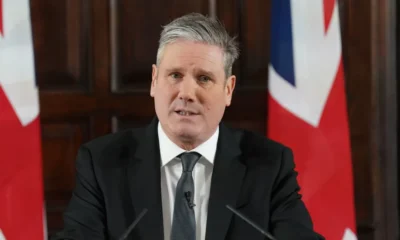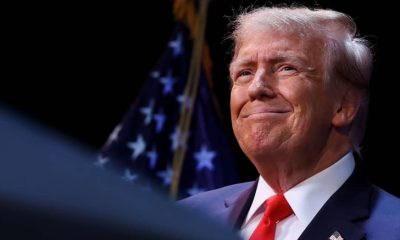NEWS
Who is Jamal Khashoggi? All you need to know about the missing journalist

Influential journalist Khashoggi is feared dead after his October 2 disappearance inside the Saudi consulate in Istanbul.
Jamal Khashoggi is one of most influential Arab journalists and political commentators of his time, owing to a career that has spanned nearly 30 years.. No one has seen or heard from him since October 2. That was the day when he walked into Saudi Arabia’s consulate in Istanbul. Turkish government officials have said he was killed inside the office.
Born in Medina in 1958, Khashoggi was once close to the inner circles of the Saudi royal family, where he earned his reputation as a reformist by pushing the boundaries of critically questioning Saudi’s regional and domestic policies.
The young Khashoggi studied journalism at Indiana University in the United States and began his career as a correspondent for the English language Saudi Gazette newspaper.
From 1987 until 1990, he reported for the London-based and Saudi-owned Asharq Al-Awsat daily. He also spent eight years writing for the pan-Arab Al-Hayat newspaper.
Khashoggi is best known for coverage of the events of Afghanistan, Algeria, Kuwait and the Middle East in the 1990s. He met and interviewed Osama bin Laden several times in the middle of the decade, before the latter went on to become the leader of the al-Qaeda group.
In 1999, Khashoggi became the deputy editor for the Saudi-run newspaper Arab News, and remained in that position for four years. His next position as the editor-in-chief of the Al-Watan paper barely lasted two months before he was dismissed from the post without explanation in 2003. However, some hinted his “editorial policy” was to blame.
The journalist then became a media adviser to Prince Turki bin Faisal, who was the former head of Saudi Arabia’s General Intelligence Directorate and served as the Saudi ambassador to the US from 2005 until the end of 2006.
Khashoggi was reinstated as the editor of Al-Watan in 2007, but was fired again in 2010, for “pushing the boundaries of debate within Saudi society” according to his personal website.
In the same year, Khashoggi was appointed as general manager of the Al Arab news channel, which was owned by Prince Alwaleed bin Talal and operated out of Manama, Bahrain. The channel shut down barely one day after its launch in February 2015, with some speculating that the hosting of a Bahraini opposition member was part of the larger editorial issue with Bahrain.
Khashoggi also served as a political commentator, appearing on a number of Saudi and Arab channels.
‘Ordered to shut up’
Following the rapid rise through the ranks of Mohammed bin Salman (MBS), Khashoggi lent his voice to call out the crown prince’s policies at home, particularly after promises of reform were followed by a wave of arrests and repression.
Princes, prominent businessmen, activists, and Muslim leaders were not spared from the crackdown, which was orchestrated by MBS.
Khashoggi continued to write, and advocate for freedom of speech in his country, and in September 2017 he criticised the classification of the Muslim Brotherhood as terrorists by Saudi Arabia.
In a post on Twitter, he wrote: “For a while now, I have found that anyone who believes in reform, change, the Arab Spring, and freedom, and those who are proud of their religion and their country is labelled as being part of the Muslim Brotherhood. It seems that the Brotherhood’s school of thought is noble.”
|
|
Due to his candour, Khashoggi’s presence in the kingdom was becoming more precarious by the day and eventually, he moved to Washington, DC, after revealing that he was “ordered to shut up”.
In the same month, he published an article with The Washington Post under the title “Saudi Arabia wasn’t always this repressive. Now it’s unbearable”.
Khashoggi shared it on Twitter and wrote, “I was not happy to publish this article on The Washington Post, but silence does not serve my country or those detained.”
The post earned the ire of Prince Khaled Al Saud, the governor of Mecca province, who criticised him on Twitter. “Our guided leadership does not need advice from you and your likes,” Saud shot back.
A few months later, in December, Al-Hayat newspaper ended its relationship with him and banned his writings, citing Khashoggi’s perceived “transgressions against Saudi Arabia”.
Critiquing Saudi policies
During his stay in Washington, DC, he participated in many activities to defend freedoms and rights.
In his new role as opinions editor for The Washington Post, Khashoggi became more vocal about his criticism of MBS, likening him to Russian President Vladimir Putin.
In a May 21 column for The Washington Post, he wrote: “We are expected to vigorously applaud social reforms and heap praise on the crown prince while avoiding any reference to the pioneering Saudis who dared to address these issues decades ago.
“We are being asked to abandon any hope of political freedom, and to keep quiet about arrests and travel bans that impact not only the critics but also their families.
Unfortunately, the Saudi regime is such that it cannot stomach even moderate criticism and this is what they do to moderate critics.
Khashoggi also called out MBS’ “impulsivity” as displayed in the debacle of Lebanese Prime Minister Saad Hariri’s forced resignation from Riyadh (once back in Beirut, Hariri retracted his notice) to Saudi’s role in the Yemen war.







